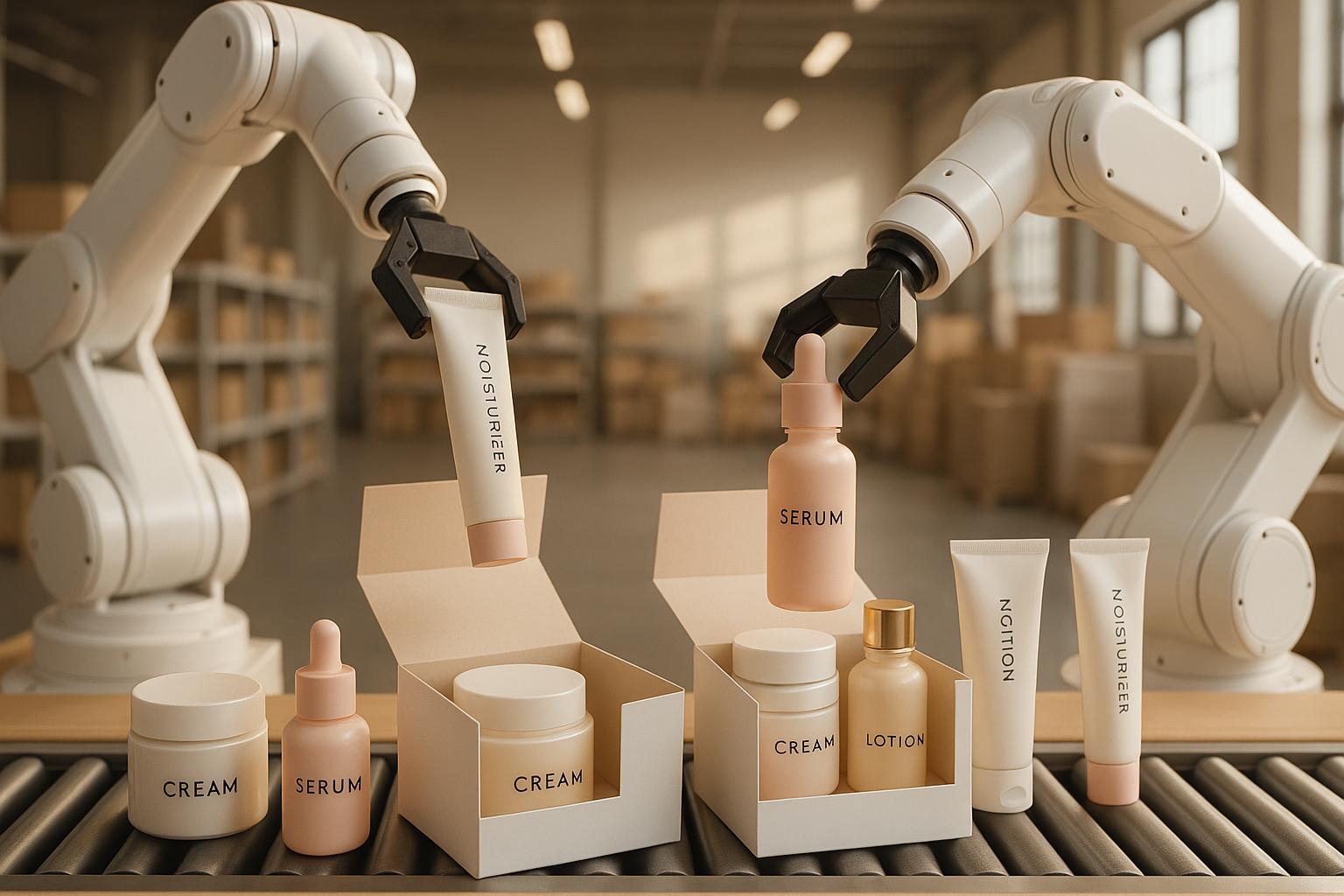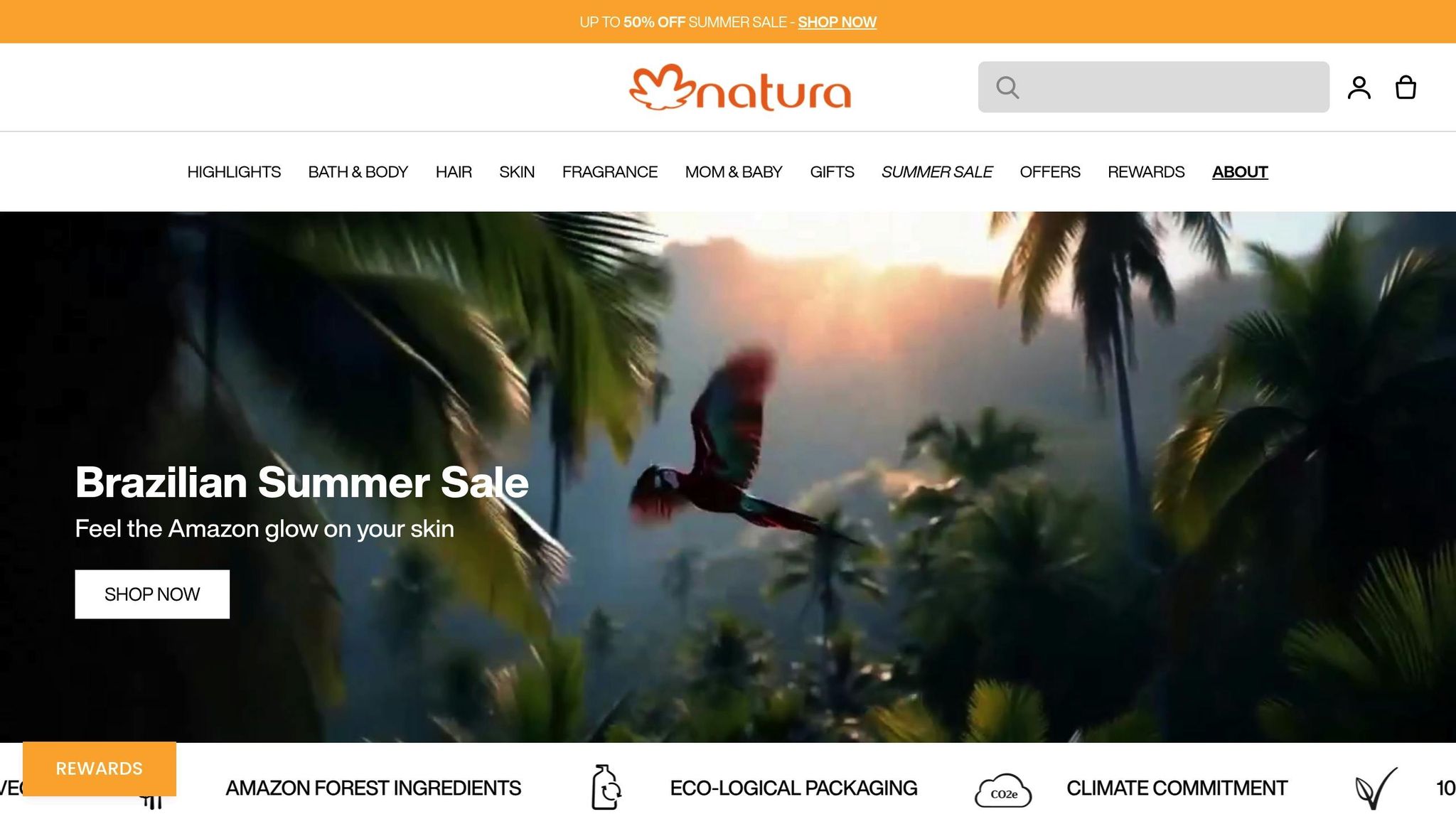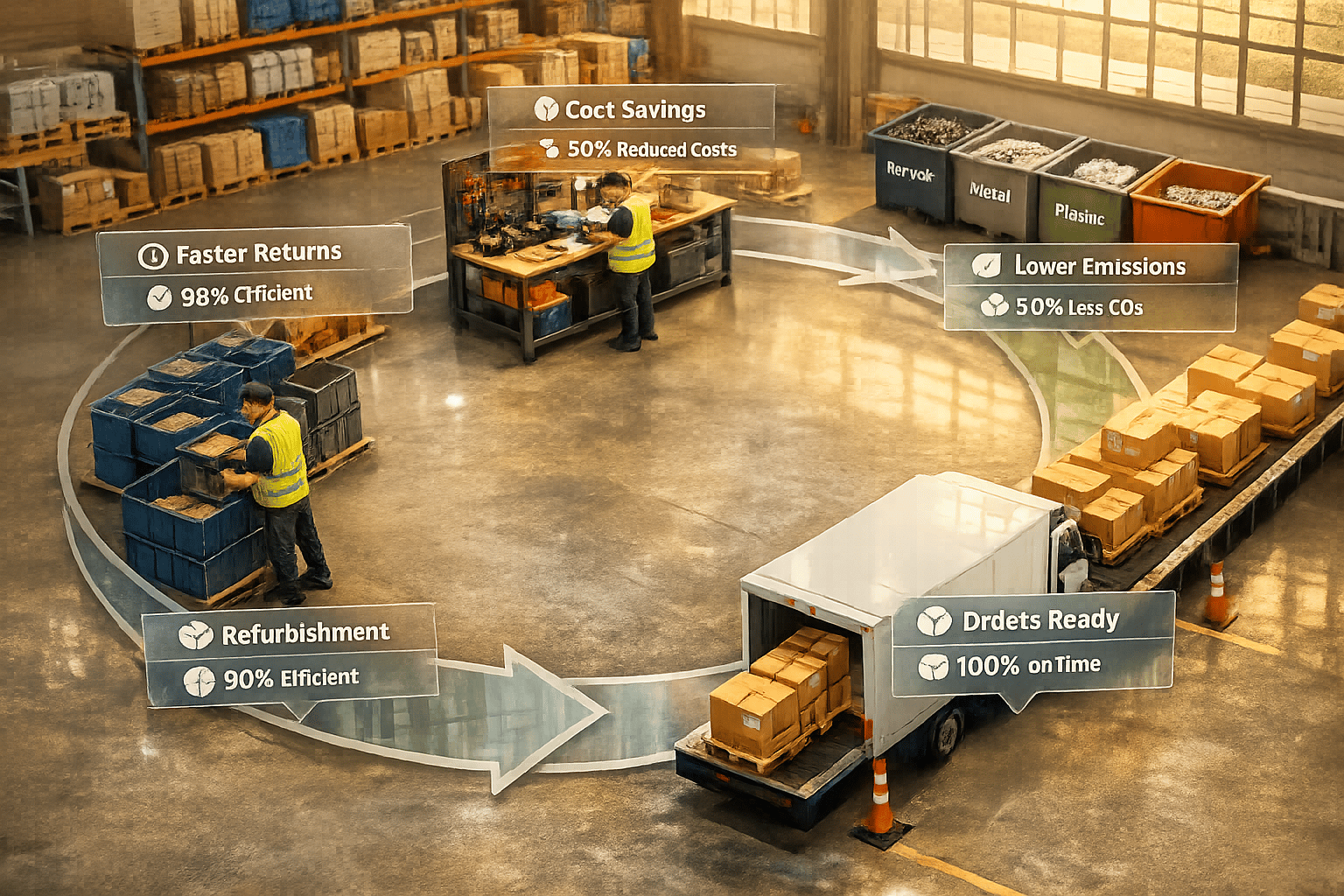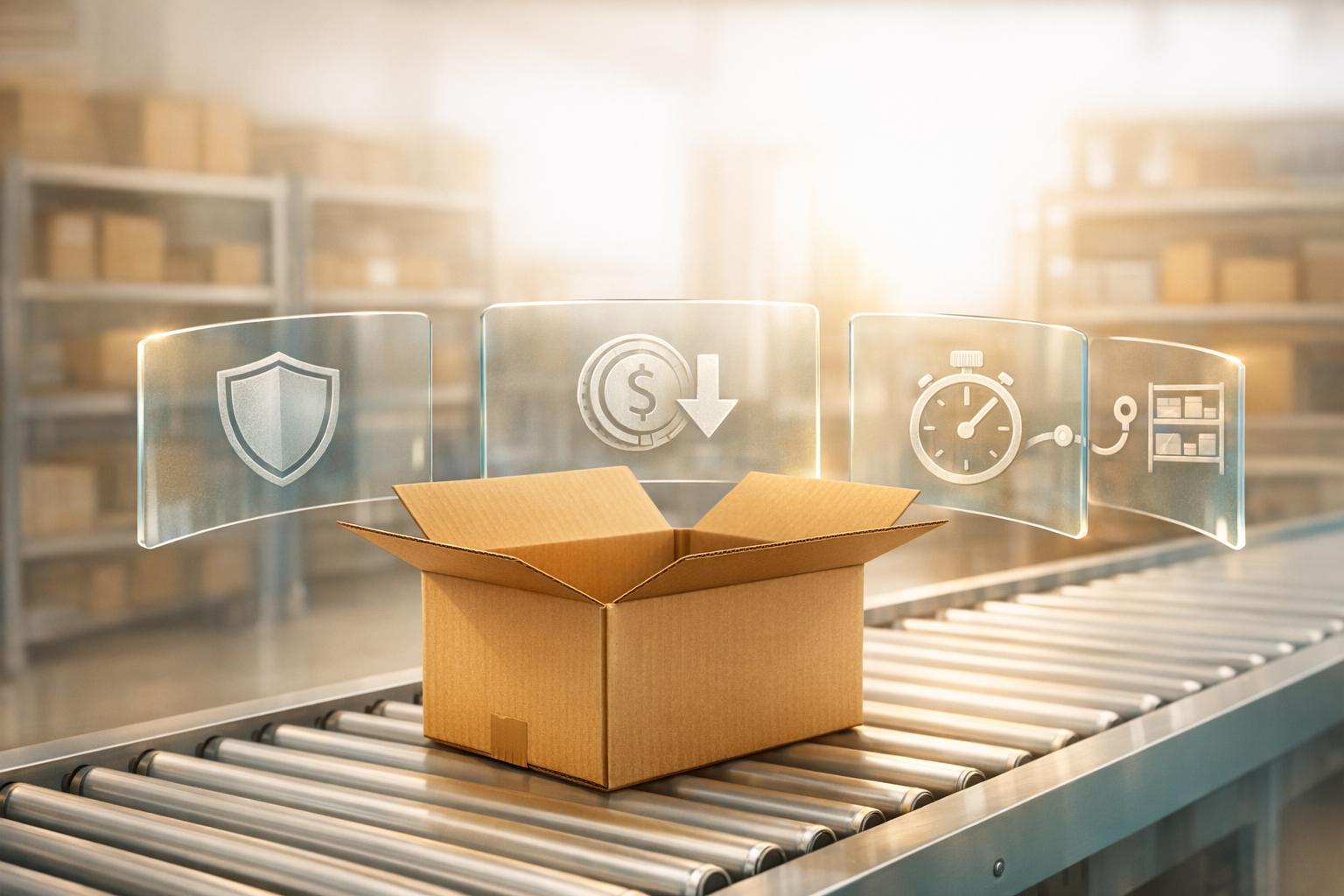Automated Kitting and Packing for Skincare Brands That Can’t Compromise on Quality

Scaling a skincare brand while maintaining quality is no small task. Automated kitting and packing solutions make it possible by improving efficiency, reducing errors, and ensuring consistent product presentation. Here’s how automation is transforming the skincare industry:
- What is Automated Kitting? It’s the process of assembling products (like skincare sets or promotional bundles) using advanced machinery instead of manual labor. This improves speed and accuracy while reducing mistakes.
- Why Quality Matters: Skincare customers expect flawless products and packaging. Poor delivery experiences or errors can damage trust and lead to customer loss.
- Key Challenges: Skincare products are sensitive to temperature, have strict regulatory requirements, and require precise handling to avoid spoilage or contamination.
- How Automation Helps: Technologies like robotic pick-and-pack systems, AI-driven quality checks, and real-time tracking ensure 99.9% accuracy and minimize waste.
- The Role of 3PL Providers: Companies like JIT Transportation offer specialized logistics services, including temperature-controlled storage, kitting, and white-glove handling, to help brands scale without sacrificing quality.
Bottom Line: Automation and expert logistics partners allow skincare brands to grow efficiently while meeting the high standards their customers expect.
Cosmetics, Supply Chain, Warehouse Automation, Logistics Software, Natura Brazil Cosmetics

Fulfillment Challenges for Skincare Products
Skincare brands face a unique set of challenges when it comes to fulfillment. Unlike traditional e-commerce, these products demand specialized handling, precise temperature controls, and a meticulous approach to ensure quality and customer satisfaction. This is where automation becomes a game-changer.
Product Sensitivities and Regulatory Compliance
Skincare products are notoriously sensitive. A slight temperature fluctuation can spoil items - heat can separate a moisturizer or cause vitamin C serums to oxidize. These issues are costly. The cosmetics industry loses around $4.8 billion annually to product spoilage, a staggering figure in an industry worth $262.21 billion in 2022.
To prevent such losses, skincare brands rely on strict shelf-life management. Systems like FEFO (First Expired, First Out) and FIFO (First In, First Out) are essential to ensure products don’t sit in warehouses past their expiration dates. Without these systems, expired inventory can lead to significant financial write-offs.
"Positioning a cosmetics brand for success is heavily reliant on being able to successfully distribute product. If supply chain challenges put up roadblocks, it becomes nearly impossible to build a brand that is a trusted consumer choice." - ITS Logistics
On top of product sensitivities, brands must navigate a maze of regulatory requirements. The FDA enforces strict rules around cosmetic labeling, ingredient disclosures, and safety standards. Fulfillment partners need to stay compliant with these regulations while maintaining accurate documentation throughout the supply chain.
Customer Expectations for Perfect Packaging
These high product standards naturally raise customer expectations for packaging. Today’s consumers demand more than just functional shipping - they expect a luxurious unboxing experience. This involves not only ensuring the package arrives undamaged but also delivering a presentation that reflects the brand’s premium image.
85% of customers won’t reorder if they have a poor e-commerce fulfillment experience. For skincare brands, this means packaging must be flawless. Protective measures like bubble wrap, padded envelopes, and custom-designed boxes are common. But it doesn’t stop there - many brands include branded touches like tissue paper, ribbons, or thank-you notes to elevate the experience.
"Today's beauty customer expects more - flawless products, perfect packaging, and fast delivery - no exceptions. One shipping mistake or damaged order can lose a loyal customer for good." - Boxzooka
Speed also plays a critical role. 42% of online shoppers expect 2-day shipping, which puts immense pressure on fulfillment operations to balance quick delivery with careful handling. Skincare brands often add another layer of complexity by offering personalized products, gift sets, or promotional bundles, requiring detailed kitting services to assemble orders.
The Cost of Errors in Skincare Fulfillment
The stakes are high when it comes to fulfillment errors. Mistakes - whether in picking, packing, or shipping - can have far-reaching consequences. Beyond the immediate cost of returns, errors can damage customer trust and loyalty. For skincare brands, where consistency and quality are non-negotiable, even small missteps can leave a lasting impact.
Consider this: warehouses experience an average picking error rate of 1–3%, which can reduce profitability by up to 13%. Add to that the fact that labor costs account for 55–65% of operating expenses, and it’s clear how errors can quickly escalate costs.
-
Temperature Damage
- Impact: $4.8B in annual losses
- Prevention Strategy: Climate-controlled facilities
-
Picking Errors
- Impact: Up to 13% profitability loss
- Prevention Strategy: Automated picking systems
-
Packaging Mistakes
- Impact: 85% customer loss on poor experiences
- Prevention Strategy: Standardized SOPs and quality checks
Automation offers a solution to many of these issues. Systems capable of achieving 99.9% picking accuracy reduce human error, ensuring every order meets the high standards skincare customers expect.
For skincare brands, fulfillment isn’t just about efficiency - it’s about preserving the trust and quality their customers rely on. By leveraging automation, brands can address these challenges head-on, ensuring accuracy, protecting product integrity, and delivering the premium experience their customers demand.
Automation Technologies for Skincare Fulfillment
Automation technologies tackle the challenges of skincare fulfillment by ensuring careful handling and strict management of expiration dates. These systems are specifically designed to address the unique needs of beauty products, from fragile packaging to maintaining the pristine condition that skincare brands require.
Key Automation Tools for Kitting and Packing
Robotic pick-and-pack systems are now more advanced than ever, with companies like Staci Americas leading the charge in cosmetics-specific automation. Using robotics integrated with Locus Robotics, Staci Americas has developed a system that tracks every step of the process. Austin Feagins explains:
"We know product A came from location one, was scanned by robot one, and delivered to pack station four".
This integration creates a detailed digital record, ensuring accountability and precision throughout the fulfillment process.
Overhead camera systems with AI-driven visual inspection software have also revolutionized packing operations. At Staci Americas, these cameras monitor processes in real time, flagging issues such as incorrect lipstick shades or missing protective materials. Beyond error detection, the system analyzes worker behavior to suggest process improvements - saving two seconds per box. While it may seem minor, these small efficiencies add up significantly over time.
Inline scanning and weighing systems further enhance quality control by double-checking boxes after packing. They flag any packages with unexpected weights for manual inspection, catching errors that might otherwise slip through.
As Austin Feagins points out, skincare fulfillment is far from straightforward:
"It's not like shipping paper towels... Cosmetic and personal care fulfillment involves a staggering SKU count, varied product sizes and materials, and customers who expect everything to arrive not just intact, but pristine".
Barcode and RFID tracking systems are another crucial tool, recording every movement of products within the warehouse. These systems ensure visibility from the moment items are received to their final shipment, seamlessly integrating with larger fulfillment operations for efficient inventory management.
Real-Time Inventory Tracking and Batch Control
Real-time tracking systems are the backbone of skincare fulfillment operations. By providing up-to-the-minute updates on inventory levels and movements, these systems help businesses respond quickly to market demands and avoid costly stockouts.
Warehouse Management Systems (WMS) are particularly effective for beauty brands. For instance, companies using these systems report dispatch times up to 50% faster. In an industry where 42% of online shoppers expect 2-day shipping, this speed is critical. Branded Beauty, after adopting Canary7's WMS, shared their success:
"Orders are now processed more quickly and precisely, with fewer errors and higher levels of customer satisfaction. This is a result of Canary7's real-time inventory tracking and order fulfillment capabilities".
Batch control systems play a vital role in managing the expiration dates of skincare products. By implementing FEFO (First Expired, First Out) and FIFO (First In, First Out) protocols, these systems help reduce waste and ensure products are shipped within their shelf life.
Real-time tracking also supports proactive demand forecasting. By analyzing current inventory alongside historical sales data, these systems help warehouses adjust stock levels to meet future needs, avoiding both overstocking and stockouts.
By integrating data across inventory, orders, and shipping, these systems create a centralized platform. This ensures that when a customer places an order, the system can immediately check product availability, determine the best picking routes, and configure the most efficient packing method.
Reducing Human Error and Improving Efficiency
Given the delicate nature of skincare products, minimizing human error is essential. Mistakes in fulfillment can harm both brand reputation and profitability. For perspective, human error accounts for 90% of all security breaches.
Picking systems guide workers through the assembly process using visual cues, voice commands, or handheld scanners. This reduces the risk of selecting the wrong products or quantities, ensuring consistency across shifts and workers.
Intelligent detection sensors integrated into packaging lines add another layer of quality control. These sensors monitor factors like product weight and packaging integrity, catching errors before items leave the facility.
Automation also brings speed. With three out of four beauty brands investing in fulfillment automation, it’s clear that automated systems outperform manual processes in both speed and accuracy by eliminating human variability.
Labeling machines ensure packages are accurately labeled with correct addresses, tracking numbers, and handling instructions. These machines integrate with inventory systems to reduce shipping errors and ensure smooth delivery.
Finally, tracking systems provide real-time data on supply locations and statuses, helping fulfillment centers quickly identify and resolve bottlenecks. This proactive approach is essential to maintaining the fast delivery times skincare customers expect.
Together, these technologies create a streamlined fulfillment environment where errors are minimized, processes are efficient, and quality is consistently high - key factors for skincare brands looking to scale while maintaining high standards.
sbb-itb-eafa320
Quality Control and Brand Consistency
In the world of skincare, quality control isn’t just about catching mistakes - it’s about preserving the integrity of the product while delivering the premium experience customers expect. With the cosmetic industry operating under strict quality standards, automated quality control has become a must-have for brands that prioritize excellence. Let’s explore how automation is transforming quality control and ensuring brand consistency.
Automated Quality Control Systems
Manual inspections, while traditional, come with a hefty price tag when mistakes slip through. Studies show that catching errors during production is ten times cheaper than addressing them after development - and 100 times cheaper than fixing issues once products reach customers. This is where automated systems step in, offering both precision and efficiency.
AI-powered vision systems are now leading the charge in skincare quality control. These systems can inspect a variety of packaging materials, from metal and glass to plastic, ensuring even the smallest imperfections don’t go unnoticed. The numbers speak for themselves: automated systems can handle up to 70,000 pieces per hour, far outperforming human capabilities.
A great example of this is Toly, a cosmetics packaging manufacturer, which implemented Scortex’s Spark system in September 2024. The results were immediate. Olaf Zahra, Toly’s Technical and Sustainability Manager, highlighted the advantages:
"The biggest advantage we've found with the Spark system is the ease of configuration. We can go from inspecting one decoration to another in a matter of minutes, an hour at most, rather than days... Detecting the problem immediately, stopping the process and making adjustments, gives you a considerable advantage in terms of reject rate reduction".
These systems don’t just boost precision - they also save time. By comparing products against an "ideal" benchmark, machine vision systems can spot deviations, detect cosmetic defects, and flag contaminants in real time. On average, automation reduces inspection times by 50%, all while maintaining consistent, high-performance operations. This level of efficiency ensures that both product quality and the brand’s reputation remain untarnished.
Custom Packaging and Branding Solutions
Quality control doesn’t stop at the product itself; packaging and labeling are just as critical. Every detail, from the placement of a label to the integrity of a cap liner, contributes to the overall brand experience. Advanced labeling systems now include integrated barcode verification, instantly rejecting any misprinted labels to ensure compliance and traceability.
Meanwhile, automated cap lining and wadding systems insert protective liners into containers, preventing leaks, contamination, and evaporation. These solutions ensure uniformity across thousands of units, reinforcing the reliability customers expect from premium skincare brands.
Value-Added Services by JIT Transportation

When it comes to fulfillment, JIT Transportation goes the extra mile to protect product quality. With 2.5 million square feet of warehouse space spread across 14 U.S. locations, they provide specialized services tailored to the unique needs of skincare brands.
- Testing and Revision Upgrades: Products are carefully checked and adjusted before shipping, helping brands manage batch variations or seasonal changes without risking quality.
- White Glove Handling: Premium skincare products receive the care they deserve, with specialized storage, gentle handling, and reinforced packaging to uphold their luxury appeal.
- Kitting and Assembly: Custom gift sets, seasonal collections, and promotional bundles are assembled with precision, ensuring every kit meets the same high standards.
- Quality Assurance Checks: From visual inspections to packaging integrity tests, every shipment aligns with the brand’s established standards. Custom labeling and barcoding further ensure compliance while maintaining a polished look.
This blend of automation and specialized services creates a fulfillment process where quality is never sacrificed for speed. For skincare brands, it’s a way to scale operations while preserving the meticulous attention to detail that customers recognize and trust. By integrating these measures, brands can grow without compromising the standards that define their reputation.
Scalable 3PL Solutions for High-Growth Skincare Brands
The skincare market, valued at $109.71 billion in 2023, is expected to grow to $194.05 billion by 2032. This rapid expansion creates a unique challenge for brands: scaling operations while maintaining top-notch quality. Third-party logistics (3PL) providers step in to offer solutions that go far beyond simple warehousing and shipping.
The Role of 3PL Providers in Scaling Operations
For skincare brands, scaling isn't just about shipping more products - it's about maintaining speed, quality, and a consistent brand experience. Advanced 3PL providers tailor their kitting processes to meet specific brand needs, ensuring seamless execution even as demand grows. This allows brands to focus on what they do best - like creating innovative products and running marketing campaigns - while the logistics experts handle the complexities of fulfillment.
"The best beauty brands aren't just selling products - they're selling experience."
- Mike DeFabis
Every customer interaction, from the condition of the packaging to the delivery timeline, reflects on the brand itself. 3PL providers help reduce risks by implementing contingency plans and diversifying supplier networks, ensuring growth doesn’t come at the cost of customer satisfaction.
Additionally, 3PLs offer adaptable packaging solutions to accommodate new SKUs, campaigns, or retail partnerships. Whether it’s a limited-edition launch or expanding into new sales channels, these providers can adjust their operations without requiring brands to invest in additional infrastructure or staffing.
These strategies not only enhance efficiency but also set the stage for stronger inventory and delivery systems - topics that will be explored further in the next section.
Benefits of Nationwide Networks and ERP Integration
A nationwide 3PL network can deliver to 95% of U.S. households within two days using ground shipping. For skincare brands, this capability can dramatically improve the customer experience.
Take JIT Transportation, for example. Their network includes strategically located, high-tech warehouses that store inventory closer to customers, cutting delivery times and reducing shipping costs. This setup also builds resilience - if one facility faces disruptions, orders can be rerouted without compromising service quality.
"A nationwide 3PL network doesn't just make shipping faster - it makes your business smarter."
- Stu Spikerman, Tri-Link FTZ
Stu Spikerman of Tri-Link FTZ highlights how modern 3PL networks use advanced technologies like transportation management systems (TMS), warehouse management systems (WMS), and track-and-trace tools. These systems provide real-time visibility into supply chain operations, which is especially critical for skincare products that often have shorter shelf lives and require precise inventory control.
"We've even helped businesses balance inventory across locations to prevent out-of-stock issues."
- Stu Spikerman, Tri-Link FTZ
This proactive inventory management approach is essential for scaling businesses. Real-time tracking helps prevent both overstocking and stockouts, ensuring smooth cash flow and happy customers. Reflecting this trend, 66% of logistics leaders increased their outsourcing budgets in 2021, with 74% planning further increases in the near future.
Automated vs. Manual Kitting and Packing: A Comparison
Deciding between automated and manual kitting and packing is a crucial step for growing skincare brands. Each method comes with its own pros and cons in terms of cost, speed, and scalability.
-
Upfront Cost
- Manual Kitting: Lower investment required
- Light Touch Automated: Moderately higher than manual
- Fully Automated Kitting: Significant upfront investment
-
Speed & Throughput
- Manual Kitting: Slower processing times
- Light Touch Automated: Faster than manual operations
- Fully Automated Kitting: Highest throughput capacity
-
Flexibility
- Manual Kitting: High adaptability to variations
- Light Touch Automated: Flexible for complex tasks
- Fully Automated Kitting: Limited to standardized processes
-
Quality Consistency
- Manual Kitting: Variable, depends on workers
- Light Touch Automated: Improved accuracy over manual
- Fully Automated Kitting: Highest consistency and standardization
-
Scalability
- Manual Kitting: Challenging during peak times
- Light Touch Automated: Scalable for moderate volumes
- Fully Automated Kitting: Easily handles high volumes
Manual kitting is ideal for brands that need flexibility, such as those launching seasonal collections or limited-edition products. However, this flexibility often comes at the cost of speed and consistency, which can impact the brand's reputation in a competitive market.
Light automation strikes a balance by combining human oversight with machine precision. It’s particularly useful for handling delicate items or complex assembly tasks while improving accuracy and efficiency. Fully automated systems, on the other hand, are perfect for established brands with stable product lines. They excel at producing consistent, high-quality outputs at scale, even during peak demand periods.
"Scaling a beauty brand means translating customer expectations into operational precision. The best beauty fulfillment partners build every service offering around protecting product integrity, reinforcing brand identity, and enabling operational flexibility."
For skincare brands that prioritize quality, automation often proves to be a worthwhile investment. It reduces error rates, boosts consistency, and prepares brands to handle larger volumes without compromising standards. The choice of kitting method ultimately depends on the brand's current needs, growth plans, and product complexity. Many brands start with manual or light automation before transitioning to fully automated systems as they expand.
Conclusion: Scaling Skincare Fulfillment Without Compromising Quality
As the skincare market continues to grow rapidly, brands face the challenge of scaling operations while maintaining the quality that customers expect. Operational excellence is key to navigating this balance effectively.
Key Takeaways
Automation drives efficiency and consistency. A significant 84% of CPG companies already use automation in kitting processes, with this number expected to reach 93% in the next five years. Light automation provides skincare brands with the perfect blend of precision and human oversight, ensuring delicate products are handled carefully while remaining flexible enough for seasonal campaigns and new launches.
Quality control protects your brand. Automated systems minimize manual errors, ensure uniform packaging, and enable batch tracking - critical for skincare products with shorter shelf lives. These measures safeguard both product integrity and customer trust.
Strategic partnerships enable scalability. Outsourcing kitting to specialized 3PL providers can save time, reduce shipping errors, and enhance the unboxing experience, reinforcing your brand's identity. A skilled logistics partner understands the nuances of the skincare industry, from temperature-sensitive shipping to regulatory compliance and luxury packaging expectations.
Data-driven decisions streamline operations. Kitting reduces SKU complexity by consolidating frequently purchased items, optimizing inventory management, and cutting labor and storage costs.
These strategies provide a roadmap for scaling efficiently without sacrificing quality.
How JIT Transportation Can Help
JIT Transportation applies these principles to offer comprehensive logistics solutions that help skincare brands grow while maintaining quality. With over 30 years of experience, JIT operates 14 warehouses nationwide, covering over 2.5 million square feet. This extensive network ensures the fast delivery that 42% of online shoppers now expect, including two-day shipping.
JIT’s services include specialized kitting and assembly, temperature-controlled handling for sensitive products, and seamless integration with platforms like Shopify, Magento, and WooCommerce. Their advanced Warehouse Management System provides real-time tracking and ensures order accuracy, critical for batch control and compliance in the skincare industry.
Whether you're preparing for a new product launch, expanding into new markets, or managing seasonal spikes in demand, JIT’s scalable infrastructure adapts to your needs. From pick-and-pack services to premium white-glove handling, they help uphold the quality your brand is known for.
Interested in taking your skincare fulfillment to the next level? Contact JIT Transportation to explore how their tailored 3PL solutions can streamline your supply chain while delivering the quality your customers deserve.
FAQs
How does automated kitting and packing help skincare brands maintain consistent quality?
Automated kitting and packing help skincare brands maintain consistent quality by standardizing the assembly process. This approach minimizes mistakes, reduces inconsistencies, and ensures that every kit is assembled with precision to uphold your brand’s reputation.
What’s more, automation includes ongoing quality checks, accelerates production, and cuts down on human error. The result? Uniform packaging, flawless presentation, and dependable product quality that consistently meets customer expectations.
How can 3PL providers like JIT Transportation help skincare brands grow while maintaining quality?
Partnering with a 3PL provider like JIT Transportation gives skincare brands the tools to grow effectively while maintaining their high standards. By tapping into specialized logistics expertise, brands can cut down on operational expenses, simplify packaging and shipping workflows, and maintain a consistent and polished product presentation.
JIT Transportation also brings advanced automation and scalable solutions designed specifically for fast-growing e-commerce businesses. This means skincare brands can channel their energy into creating innovative products and enhancing the customer experience, all while leaving the challenges of fulfillment and logistics to a trusted partner. A 3PL provider offers the flexibility and dependability to keep up with increasing customer demand without compromising quality.
How do automated quality control systems help skincare brands maintain product consistency and meet regulatory standards?
Automated quality control systems play a crucial role in ensuring skincare products meet rigorous standards. Using sensors, cameras, and sophisticated algorithms, these systems can spot defects and inconsistencies during production with impressive accuracy. They offer real-time monitoring, enabling manufacturers to address issues immediately. This not only reduces errors but also helps meet the strict regulations that govern the skincare industry.
By automating quality checks, skincare brands can deliver consistent products, improve customer satisfaction, and expand their operations without sacrificing quality. This is especially important in an industry where precision and presentation significantly influence brand reputation.
Related Blog Posts
Related Articles

How 3PLs Support Circular Supply Chain Models

Top Challenges in Returns AI Solves

